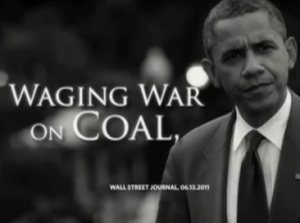When it comes to money and power, nothing is cut and dry, and it never seems to be in the interest of the working people. After seeing more signs and billboards pointing out specific politicians and agencies for the woes of the Appalachian coal miner, I knew someone wanted me to think a certain way. One thing led to another, and I began to consider a more complex understanding of the “War on Coal.” It doesn’t mean I’m right, but it’s something to consider.
How hard is it be to believe that the power companies, coal companies, and natural gas (i.e. oil) companies, all discuss our nation’s energy future? In other words, is it possible that they are working together to maximize their profits as coal reserves are depleted and natural gas production increases?
The natural gas industry knows they have a product that is cleaner than coal. The power companies know they have aging coal fired power plants, and that natural gas plants are cheaper to build without massive smoke stacks, scrubbers, coal ash impoundments, and everything else that is needed to make burning coal “clean.”
The coal industry knows there is not much coal left in Appalachia. What there is too deep and expensive to mine and still make a decent profit. Their best alternative is to decrease labor costs by using heavy machinery and explosives to surface mine the remaining recoverable coal reserves (i.e. mechanization).
The problem for both industries is that natural gas exploration and surface mining for coal are detrimental to the environment and therefor the local people. The industries need a way to manipulate local communities so they would dismiss any possible connections between health issues and extraction, while building larger public support for industry business goals.
The natural gas industry works with Democrats to enact new environmental regulations making coal more expensive to mine and burn. Due to the nation’s latent dependency on coal for cheap electrical generation, the new regulations drive up electrical rates, thereby creating public support for an alternative energy source to keep rates low—natural gas.
This public support makes it easier for republicans to work with and provide subsidies for further natural gas development, gutting environmental regulations that would hinder hydraulic fracturing, as well as opening up public lands for drilling (see the Energy Policy Act of 2005 and Haliburton Loophole advocated for Dick Cheney and the Bush Administration).
In the coalfields, coal markets get squeezed and workers in the industry are laid off. Coalfield conservatives then begin their “War on Coal” propaganda. The coal companies put money into public relations campaigns like “Friends of Coal” with the intent of getting coal mining communities to fight environmental regulations.

Through using terms like “over regulation,” “War on Coal,” and “Outside Treehuggers,” as well as co-opting Appalachian culture, history, and our pride in working hard to support our families, the industry is able to manipulate people into a fighting against a “threat” to their livelihoods and even their identity as Appalachians.1 This leads to a “pro-coal” movement in local mining communities that completely ignores information about the actual water issues and cancer rate increases from coal mining. Locals even start ignoring one hundred of years of labor rights injustices in which coal companies exploited, abused, and killed coal miners and their families.
Not only do the coal companies get the benefit of having entire communities standing up to fight their battles while turning a blind eye to the health impacts—the fear of job loss among miners pushes production through the roof. After having broken all the unions, miners have no protection or rights. Fearful of “performance” based layoffs, miners are willing to work mandatory overtime to stay in the good graces of their employers.
The companies also enforce strict safety policies, threatening employees with termination if they are caught taking shortcuts in safety, while simultaneously pushing production goals that are unachievable through safe mining practices (see the Upper Big Branch Mine Disaster). Within an economically depressed area, miners do what they believe is necessary to keep their jobs to support their families, all of which equates to higher profits for the coal companies.
The “War on Coal,” and the fear it generates, also buffers coal company officials from public outrage as they file for bankruptcy. They are able to remove all health benefits from pensioners, playing it off as a necessity to continue providing jobs in tough markets. They even get by with paying out multi-million dollar “retention” bonuses to their CEOs with very few people questioning it.
Everyone gets the benefits except the workers. The natural gas companies, the power companies, the coal companies, the banks and stock holders, and politicians—on both sides—all get what they want. Even local banks in the coalfields get to cash in on all the repossessions from out of work coal miners—families who went into to debt thinking they could keep coal alive if they worked harder and fought the regulations.
Billions of dollars of coal have left Appalachia in just the last decade, and little to nothing has been done to bring in job alternatives, build up infrastructure, or address faltering education systems. Instead, coal companies and politicians continue giving everyone “Friends of Coal” stickers, continue selling license plates, while failing to mention how, even at the peak of coal production, coal producing areas in Central Appalachia remained among the poorest, most economically depressed areas in the nation with some of the worst health outcomes (see Hal Roger’s congressional district ranked as the unhealthiest district in the nation).
This is Free Market 101. Just as corporations worked towards trade policies allowing them to ship their manufacturing overseas to exploit cheap laborer and tax laws, companies work to manipulate laws, regulations, and public opinion in the United States. There are industry associations, chambers of commerce, judges, politicians, law firms, and media professionals who create and manipulate information in ways that keep people at odds and ignorant of the bigger picture.
In the end, what do we have? Mortgages, bills, children to feed and cloth, and no time to think about the truth of the situation.
- Bell, S. E., & York, R. (2010). Community Economic Identity: The Coal Industry and Ideology Construction in West Virginia. Rural Sociology, 75(1), 111–143. a9h.
↩︎

